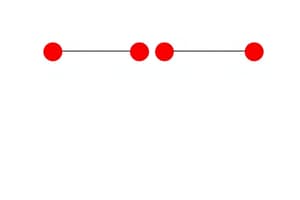Podcast
Questions and Answers
Why is the rate of diffusion important for cell function?
Why is the rate of diffusion important for cell function?
- It directly controls the storage of genetic material in the nucleus.
- It ensures that waste products are efficiently produced within the cell.
- It determines the flexibility of the cell membrane.
- It dictates how quickly particles can be used after entering the cell. (correct)
Which factor primarily limits the maximum size a cell can attain while still efficiently functioning?
Which factor primarily limits the maximum size a cell can attain while still efficiently functioning?
- The total number of mitochondria available to generate energy.
- The presence of specific organelles that support larger cell structures.
- The surface area to volume ratio which impacts nutrient exchange and waste removal. (correct)
- The strength of the cell wall in resisting external pressure.
What is the impact of a cell having a smaller concentration gradient within its cytoplasm?
What is the impact of a cell having a smaller concentration gradient within its cytoplasm?
- It makes the cell more resistant to external osmotic pressures.
- It slows down the rate at which particles move within the cell. (correct)
- It increases the rate of diffusion across the cell membrane.
- It reduces the energy required for active transport processes.
How does a high surface area to volume ratio benefit a cell?
How does a high surface area to volume ratio benefit a cell?
What poses a limitation to the potential size of a human-amoeba according to the content?
What poses a limitation to the potential size of a human-amoeba according to the content?
Why is it important for cells to minimize the distance required for diffusion?
Why is it important for cells to minimize the distance required for diffusion?
How do concentration gradients influence the movement of substances into a cell?
How do concentration gradients influence the movement of substances into a cell?
What would likely happen to a very large cell with a low surface area to volume ratio?
What would likely happen to a very large cell with a low surface area to volume ratio?
Why do scientists believe that the Paleozoic Era could sustain the existence of giant insects?
Why do scientists believe that the Paleozoic Era could sustain the existence of giant insects?
How does the speed of diffusion affect nutrient availability within a cell?
How does the speed of diffusion affect nutrient availability within a cell?
In the context of cell size and function, what does the surface area to volume ratio directly affect?
In the context of cell size and function, what does the surface area to volume ratio directly affect?
Why might a cell's reduced ability to efficiently diffuse substances lead to functional problems?
Why might a cell's reduced ability to efficiently diffuse substances lead to functional problems?
What challenge would a hypothetical cell with a volume of a human and amoeba faces regarding nutrient diffusion?
What challenge would a hypothetical cell with a volume of a human and amoeba faces regarding nutrient diffusion?
What is a direct consequence of particles taking too long to diffuse through the cytoplasm?
What is a direct consequence of particles taking too long to diffuse through the cytoplasm?
Beyond cell size, what other factor contributes to the efficiency of diffusion within a cell?
Beyond cell size, what other factor contributes to the efficiency of diffusion within a cell?
How might increased atmospheric oxygen levels, as seen in the Paleozoic Era, affect the surface area to volume ratio constraints in insects?
How might increased atmospheric oxygen levels, as seen in the Paleozoic Era, affect the surface area to volume ratio constraints in insects?
If a cell's surface area increases without a corresponding increase in volume, what is the likely outcome?
If a cell's surface area increases without a corresponding increase in volume, what is the likely outcome?
What is the limiting factor for the size of cells?
What is the limiting factor for the size of cells?
What is the most significant implication of a reduced concentration gradient within a cell?
What is the most significant implication of a reduced concentration gradient within a cell?
How did higher oxygen levels in the Paleozoic Era enable insects to grow to gigantic sizes compared to modern insects?
How did higher oxygen levels in the Paleozoic Era enable insects to grow to gigantic sizes compared to modern insects?
Flashcards
Diffusion Disadvantage
Diffusion Disadvantage
Particles move through the cytoplasm down concentration gradients, which takes time.
Cell Efficiency Requirement
Cell Efficiency Requirement
Cells need a high surface area to volume ratio to maximize efficiency.
Low Surface Area Effect
Low Surface Area Effect
Nutrient diffusion can be limited if the surface area to volume ratio is too low.
Paleozoic Era Insects
Paleozoic Era Insects
Signup and view all the flashcards
Study Notes
Introduction to Game Theory
- Game theory uses mathematical models to study strategic interactions.
- Agents are considered rational as they aim to optimize their utility.
- Game theory applies to economics, political science, biology, and computer science.
Selfish Routing Model
- Focuses on a network where n players want to travel from a starting point si to a destination ti.
- A player's strategy involves choosing a path from si to ti.
- Each edge e has a cost function le(x), where x represents the number of players using that edge.
- A player's cost is calculated by summing the latencies of the edges they use.
- Players aim to minimize their individual costs.
- Key questions include:
- Does a stable state (Nash equilibrium) always exist?
- How efficient is the stable state (Price of Anarchy)?
- How quickly can a stable state be achieved?
Braess's Paradox Example
- Illustrates a network with two possible paths, s to u to t, or s to v to t.
- Latency functions: lsu(x) = x, lut(x) = 1, lsv(x) = 1, lvt(x) = x
- Initially, players choose either path, resulting in a cost of 2.
- Adding a zero-latency edge from u to v changes the optimal strategy.
- All players then choose the s to u to v to t path, but the cost remains 2.
- This shows that adding capacity to a network can sometimes worsen performance.
Nash Equilibrium Definition
- A state where no player benefits by changing strategy alone.
- Strategy profile refers to the specific strategy for each player.
- Unilateral deviation describes only one player changing strategies.
- Strictly improved means the cost is unequivocally lower for the deviating player.
Social Cost Definition
- Social cost is the sum of all players' costs in a game.
- Described mathematically as:
- SC(P) = ∑i=1n ci(pi) where
- P = (p1,..., pn) represents the strategy profile
- ci(pi) is the cost incurred by player i using strategy pi.
Price of Anarchy Definition
- Price of Anarchy (PoA) quantifies the impact of selfish behavior on overall efficiency.
- Expressed as the ratio of the worst Nash equilibrium's social cost to the optimal social cost.
- Represented as: PoA = maxP∈NE SC(P) / minP∈S SC(P) where:
- NE is the set of Nash Equilibria.
- S is the set of all possible strategy profiles.
Further Research
- Key questions to explore
- Do Nash Equilibria always exist?
- What is the PoA in Selfish Routing?
- What is the time complexity to reach a Nash Equilibrium?
- How does this apply in other games?
Examples of Other Games
- Include auctions, fair division, coalition formation, and cost-sharing scenarios.
Studying That Suits You
Use AI to generate personalized quizzes and flashcards to suit your learning preferences.




